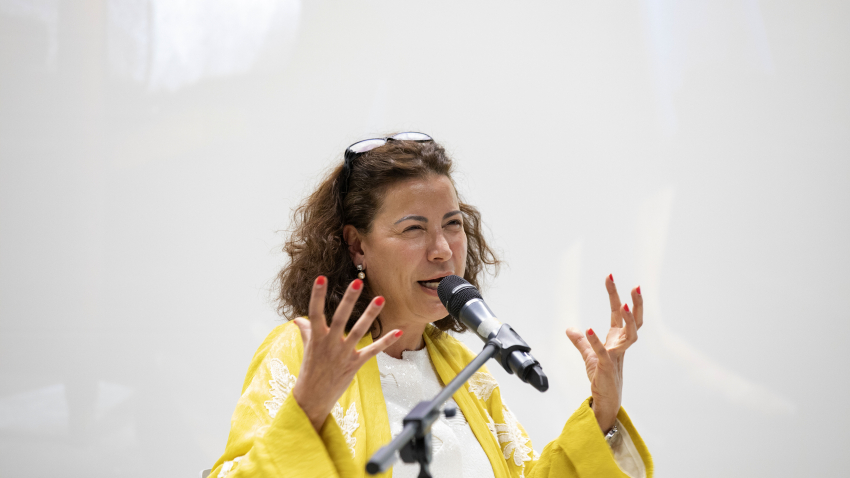
Ramallah – (A.M. Qattan Foundation) – 6 May 2017
‘Collective work is the basis of good theatre art, so I think of the Palestine Liberation Organisation (PLO) as my school of art, since it represents a model in Palestinian collective work.’ Palestinian artist and playwright Raeda Taha said during a dialogue organised by the A.M. Qattan Foundation on Saturday, 4 May 2019, at the Foundation’s Building in al-Tireh neighbourhood in Ramallah.
During the meeting, in her conversation with writer and journalist Nida’ Oweineh, Taha spoke about her artistic beginning, which some described as late, as it came after a political maturity and a valuable experience through which she overcame her pains. Taha’s first appearance on stage was as Saffiyeh in the play Returning to Haifa. Taha also played the role of Lamya’ in 80 Steps. Her artistic transformation occurred when she wrote and designed a monodrama about the martyr Ali Taha, entitled Where Can I Find Someone Like You, Ali? The play tells the story of the hijacker and freedom fighter Ali. ‘I couldn’t hijack a plane like my father, so I stepped on stage.’ Taha said.
On her latest work entitled 36 Abbas Street, which was shown in September 2017 in Lebanon, Taha explained her decision behind starting the play with the "Israeli" national anthem, Hatikvah, despite the criticism she faced. Taha believes understanding the anthem is vital and necessary for understanding the ideology of Israel. The translated anthem holds dangerous indications that listeners do not recognize. Taha used the anthem to shock the audience at the beginning of the play by playing it whole without distortion, to make the audience aware of it and the racist messages it conveys.
As for her future, Taha responded to Oweinah’s question on her future productions, saying that she is currently conducting long-term research in Haifa for a play she’s writing on a prominent Palestinian figure who she refused to reveal his/her identity. Regarding her theatre career, Taha sees that her future relies on her being on stage, and telling a story regardless of her role in it.
Raeda Taha was born in Jerusalem. Following the 1967 war, she moved to Amman and then to Beirut where she grew up and pursued her education. Later, she moved to Tunisia where she occupied the post of Press Secretary for Yasser Arafat. Taha is the daughter of martyr Ali Taha.
